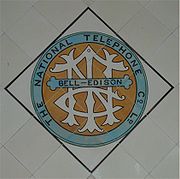
National Telephone Company
Encyclopedia

United Kingdom of Great Britain and Ireland
The United Kingdom of Great Britain and Ireland was the formal name of the United Kingdom during the period when what is now the Republic of Ireland formed a part of it....
telephone company from 1881 until 1911 which brought together smaller local companies in the early years of the telephone. Under the Telephone Transfer Act 1911
Telephone Transfer Act 1911
The Telephone Transfer Act 1911 was a United Kingdom statute, which nationalised the telephone companies. The National Telephone Company had become a monopoly and so the coalition Liberal and Labour government decided to take it into public hands....
it was taken over by the General Post Office (GPO)
General Post Office
General Post Office is the name of the British postal system from 1660 until 1969.General Post Office may also refer to:* General Post Office, Perth* General Post Office, Sydney* General Post Office, Melbourne* General Post Office, Brisbane...
in 1912.
History
Three years after the first telephone company, The Telephone Company (Bells Patents) Ltd., appeared in London (in fact it was the first in Europe), NTC was formed on 10 March 1881, as a provincial subsidiary of the United Telephone Company Limited (UTC). The NTC was initially formed to develop and operate telephone services in Yorkshire, Nottinghamshire, Ulster and parts of Scotland, taking over UTC operations in those places.The UTC developed other similar provincial companies throughout the British Isles between 1881 and 1885. The UTC then wished to create a new company for the amalgamation of all their associated companies. However, the government declined to issue the proposed new company with a licence to operate or to allow the transfer of an existing licence. The UTC then decided to use one of its provincial companies as a vehicle for their policy of amalgamation, starting in 1889 with the merger of the UTC with the Lancashire and Cheshire Telephone Company and the NTC. The 'National Telephone Company Limited' name being retained.
In 1886 it built an ornate red brick and terracotta
Architectural terracotta
Terracotta, in its unglazed form, became fashionable as an architectural ceramic construction material in England in the 1860s, and in the United States in the 1870s. It was generally used to supplement brick and tiles of similar colour in late Victorian buildings.It had been used before this in...
building 19, Newhall Street
17 & 19 Newhall Street, Birmingham
17 & 19 Newhall Street is a red brick and Architectural terracotta Grade I listed building on the corner of Newhall Street and Edmund Street in the city centre of Birmingham, England.- Overview :...
, now grade I listed, for its Birmingham Central exchange, opened in 1887.
In 1899 it commissioned Telephone House in London's Temple Lane. The building still bears the company's NT logo and some cherubs holding what appear to be old style telephone handsets.
The amalgamation policy continued; in 1890 the NTC absorbed the Northern District Telephone Company and the South of England Telephone Company, in 1892 the Western Counties and South Wales Company and the Sheffield Telephone Exchange and Electric Light Company and in 1893 the Telephone Company of Ireland Limited. Throughout this period the NTC also took over smaller telephone companies.
With the policy of amalgamation, the NTC, under the direction of William E L Gaine as general manager and Dane Sinclair as engineer in chief, set about creating a uniform organisation over eight districts; Metropolitan, Southern, Western, Midland, North-Western, Northern, Scotland and Ireland.
Following the Telegraph Acts of 1892 and 1896, NTC trunk lines were acquired and transferred to the Post Office between 1896-97. In 1901, the Postmaster General and the NTC signed an agreement to prevent unnecessary duplication of plant and wasteful competition in London.
In 1905, the Postmaster General and the NTC signed a further agreement for the purchase of the NTC's system on the expiry of its licence on 31 December 1911, an option for the Post Office that formed a part of the original licence agreement of 1881. On 31 December 1911 the NTC ceased to formally trade. The Postmaster General took over the NTC and its telephone systems and the NTC passed into liquidation.
Historical documents
- Records of the National Telephone Company (51 boxes, 8 volumes), c.1880s–c.1946 are held by BT ArchivesBT ArchivesBT Archives is an archive preserving the documentary heritage of BT and its public sector predecessors. It is designated an official place of deposit for Public Records, for those records created prior to BT's privatisation in 1984....
.
See also
- Timeline of telephone companies in Birmingham, EnglandTimeline of telephone companies in Birmingham, EnglandThis article shows the development timeline of telephone companies in Birmingham, England.Exchange names are in italics.Following the granting of a patent to Alexander Graham Bell in 1876, and the creation of the Bell Telephone Company, USA:...
- Sir William Quilter, 1st BaronetSir William Quilter, 1st BaronetSir William Cuthbert Quilter, 1st Baronet was an English stock broker, art collector and Liberal/Liberal Unionist politician who sat in the House of Commons from 1885 to 1906....
Sources
- Hold the Line Please - The Story of the Hello Girls, Sally Southall, ISBN 1-85858-239-3
- Records of the National Telephone Company, BT Archives (reference TPF)

